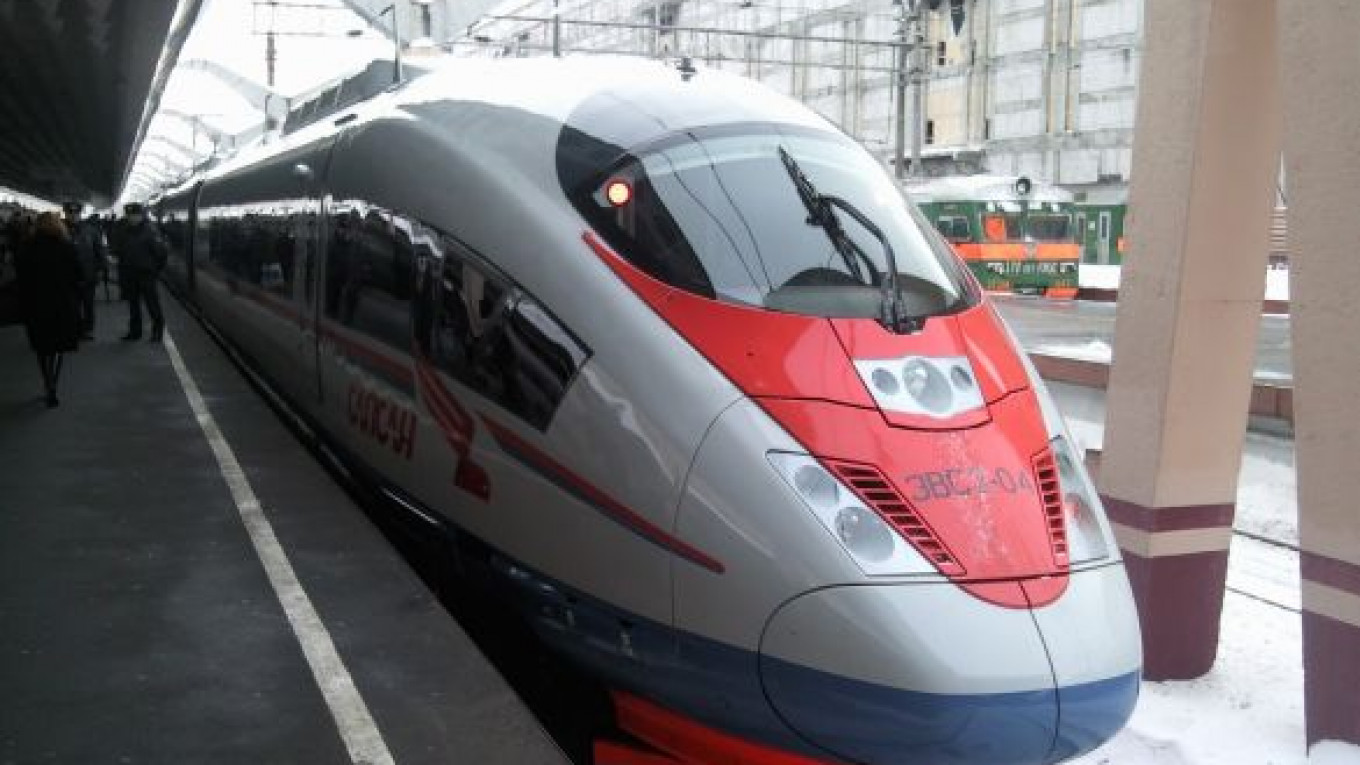Foreign investors will be invited to bid for 30-year contracts to design, build, finance and maintain new high-speed links as early as December, Russian Railways announced Friday.
Extensive high-speed lines stretching from Samara to St. Petersburg for the 2018 World Cup will cost 50 billion euros ($68 billion) and will be built under a concession system that will run over the next three decades.
High-Speed Rail Lines, the subsidiary Russian Railways created to handle the project, will present potential bidders with its strategy for development in March, and will open an international tender for the Moscow — St. Petersburg route in December.
Construction is expected to start in 2013, and the successful bidder will have to have the line ready by 2017 — one year before the World Cup kicks off in Russia in 2018.
The estimated price works out to be 14 million to 22 million euros per kilometer, but will vary from section to section depending on the local geography, said Denis Muratov, general director of High-Speed Rail Lines.
The state will shoulder up to 70 percent of construction costs, with the remainder coming from outside investors.
Most of that money is likely to come from international financial institutions, including the World Bank and the European Bank for Reconstruction and Development, Muratov said. Sberbank, VTB and VEB may also be interested.
The Moscow to St. Petersburg line is expected to cost “somewhere around” 10 billion to 15 billion euros, not including land purchases, Muratov said.
The 660-kilometer line will allow specially built high-speed trains to make the journey between the two cities in 2.5 hours. The trains will boast a top speed of 400 kilometers per hour and carry up to 8 million passengers a year.
At the moment, the fastest Sapsan trains that operate on the original line take four and half hours. A second class ticket costs 1,800 rubles to 3,200 rubles.
Preliminary maps displayed by Russian Railways show the new line running through the Tver, Novogorod and Leningrad regions, parallel to the current Oktyabrskaya rail line on the western side for most of the route.
The state will have to acquire 8,000 hectares for the route, Muratov said, but he insisted that the exact route has not yet been finalized and would be chosen by experts depending on economic merits and “numerous other factors.”
“Building a railway line is not as simple as simply going from A to B,” he insisted, but would not comment on whether it would run through built-up areas or undeveloped countryside.
If the line goes through populated areas, it is likely to cause controversy among local residents, while routing it through the countryside would expose the project to the kind of opposition from environmentalists that has dogged the Moscow-St. Petersburg highway — something Muratov conceded he was keen to avoid.
The line is just one segment of a new high-speed network that the government hopes to have in place by the time several hundred thousand foreign football fans descend on Russia in summer 2018.
A 3,000-kilometer line toward the Urals will also link Moscow to Nizhny Novgorod, Kazan, Samara and Yekaterinburg — all cities that will host matches during the tournament.
Long-term plans are afoot to build high-speed connections to Kiev and Minsk, “and to capitals throughout the former Soviet Union and Europe,” Muratov said.
The company has, however, decided to drop plans to build a southern route to Sochi, the 2014 Winter Olympic venue.
A Message from The Moscow Times:
Dear readers,
We are facing unprecedented challenges. Russia's Prosecutor General's Office has designated The Moscow Times as an "undesirable" organization, criminalizing our work and putting our staff at risk of prosecution. This follows our earlier unjust labeling as a "foreign agent."
These actions are direct attempts to silence independent journalism in Russia. The authorities claim our work "discredits the decisions of the Russian leadership." We see things differently: we strive to provide accurate, unbiased reporting on Russia.
We, the journalists of The Moscow Times, refuse to be silenced. But to continue our work, we need your help.
Your support, no matter how small, makes a world of difference. If you can, please support us monthly starting from just $2. It's quick to set up, and every contribution makes a significant impact.
By supporting The Moscow Times, you're defending open, independent journalism in the face of repression. Thank you for standing with us.
Remind me later.






